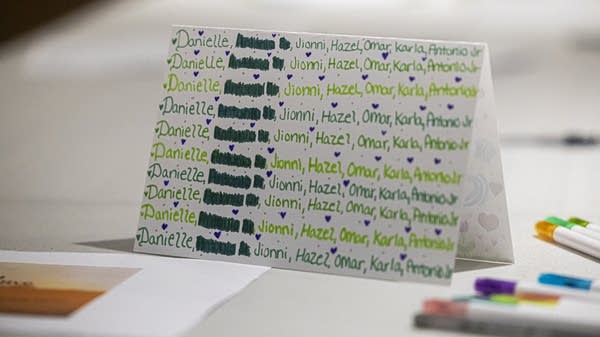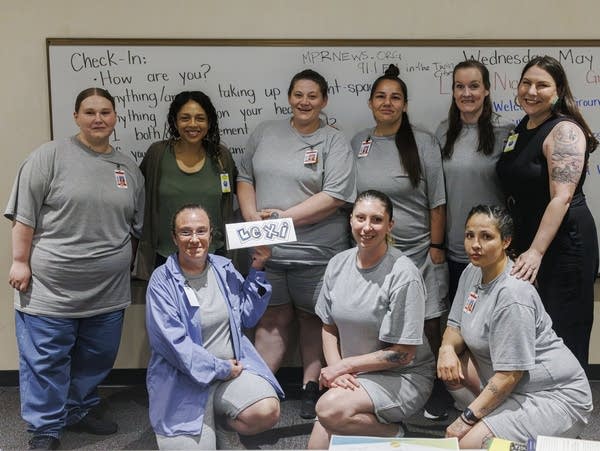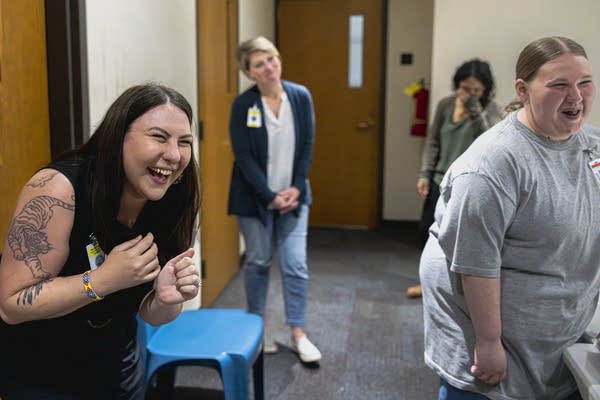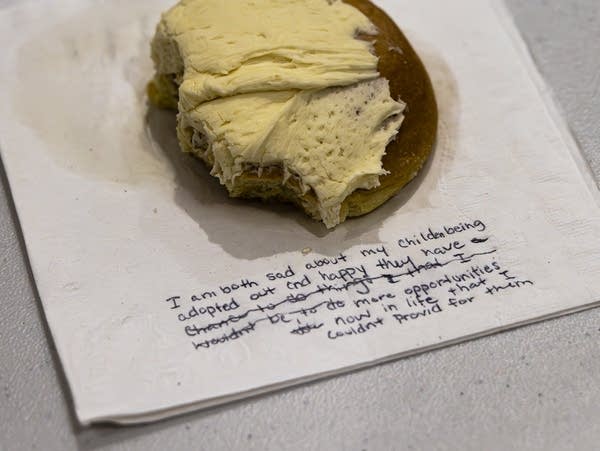At Shakopee prison, women grieve lost children, work toward redemption

Go Deeper.
Create an account or log in to save stories.
Like this?
Thanks for liking this story! We have added it to a list of your favorite stories.
Updated: 6:59 a.m.
During the final meeting of a new grief support group for women incarcerated at the Minnesota Correctional Facility - Shakopee, Sara Brown had good news to share. Her recent effort to reconnect with her daughter has been going well.
“I've been on the fence about whether or not my daughter was going to talk to me. I've talked to her every day since last week,” she told the group.
Brown lost parental rights to her oldest daughter and son 13 years ago amid a struggle with addiction.

She has been incarcerated at Shakopee since last fall. This spring, she became one of the first women at the prison to sign up for a novel support group aimed at helping participants process the grief they felt — or suppressed — when they lost parental rights.
Turn Up Your Support
MPR News helps you turn down the noise and build shared understanding. Turn up your support for this public resource and keep trusted journalism accessible to all.
Eight other women listen as Brown talks about her progress. Several group members say they also struggled with addiction that contributed to losing their parental rights. Others gave birth while incarcerated and had to give up their child immediately.

Brown says the support she received during the 12-week program has helped her manage expectations and emotions around reconnecting with her children.
“I feel like if it wasn't for this group I might not have been where I needed to be when this happened. I feel like I would have panicked or I would have pushed it away,” she said.
The support group at Shakopee may be the first of its kind aimed at a prison population, according to Bellis, a nonprofit that for decades has specialized in helping non-incarcerated women who have lost parental rights work through their grief and shame.

The hope is that by coming to terms with these losses — and the guilt associated with them — incarcerated people will develop the coping skills they need to stay out of jail in the future, said Bellis Executive Director Jenny Eldredge.
“I don't know if we'll be able to prove this keeps someone sober, this keeps someone out of prison. I really believe it's going to be true, though,” said Eldredge. “I really believe when the women tell us, ‘I'm staying sober, because I know I have this group to come to next week. And ‘I have to look these women in the eyes.’ And ‘I want to be okay for them.’”

An ‘ambiguous loss’
The support group at the prison is unique not only for the setting, but also for the type of loss participants are asked to examine, said Eldredge. She calls it “ambiguous loss.”
“That is a loss for which there's no hope of closure. So it could be someone who's lost at sea. It could even be someone who has dementia,” she said.
Or, in this case, someone who has lost parental rights.
“Your child is out there, and you're mourning that child, but the child is not dead. There's no funeral, no one brings casseroles to your house to mourn that loss,” said Eldredge.

According to a recent study led by University of Minnesota researchers, 77 percent of incarcerated women in Minnesota report that they are parents. The national average among all women is 62 percent.
Termination of parental rights can be voluntarily or involuntarily. Regardless, the parent losing rights cannot visit or talk with the child unless they have a special agreement with the adoptive parents or if the child chooses to communicate after they become an adult. Parents who have had these rights terminated can’t play a role in how the child is raised.

Custody of a child is sometimes transferred, and it may be possible in those cases to get parental rights reinstated eventually.
No matter the circumstances, the grief and shame incarcerated women feel when they have had their parental rights terminated is often minimized or ignored by society, said Eldredge.
“We think of kids in foster care, and the foster families, and adoptive families — and we should. That's right,” she said. “But somehow the mom has gotten pushed away, off to the side.”
Conflicting feelings
At the final gathering of the second cohort of Shakopee prison participants, certificates of completion are handed out along with caramel rolls to celebrate.
The women sit in a circle. The desks in front of them are decorated with brightly colored name tags and the names of their children are written on the back.

Each group member has been asked to come to the meeting with “both/and” statements — words that describe something they are both grateful for, but simultaneously sad about.
Beth Shaw shares hers.

“I both dislike and love my daughter's adoptive parents,” said Shaw, who occasionally gets updates about her 3-year-old daughter. “I have my reasons for just having some heavy feelings towards them, but also love them for what they're doing.”
It's a common theme among group members who have a range of relationships with their kids. Some have limited contact. Others, like Hallie Enno, have no relationship with their children. But she hopes that changes someday.

“When I get out I want to have my cosmetology license and actually do something with my life and so when my son does turn 18, he'll come look for me and I won't be all messed up on drugs or anything,” she said. “I'll have a place for him, be there for him when I wasn't there before.”
Having a goal like this is precisely what program supporters hope to hear from participants.

“There's a lot of research that suggests that for women, creating a situation where they can come back into contact and reconnect with family and community is the number one indicator of their success and not recidivating,” said Joanna Woolman, director of the Institute to Transform Child Protection at Mitchell Hamline School of Law.
While it's hard to prove that participating in a grief support group can prevent these women from re-offending, it's an important part of the constellation of services that could ease reentry after incarceration, said Woolman.

Other supports include helping women work through traumas like childhood physical and sexual abuse, being trafficked, or the victim of domestic violence — traumas that often lead to substance abuse or mental health problems.
The real value in these support groups is helping women manage the emotions they have about losing parental rights.
“Every individual deserves dignity and respect. And that the sort of societal shame that we put on mothers who have done something that we perceive to be bad or wrong, or doesn't live up to our expectations of what a mother should do, they pay such a heavy price,” said Woolman.
But reconnecting with their children isn't a given, she said. And reestablishing parental rights after termination is uncommon in Minnesota.
Not alone
Inmate Sara Brown said that in all her years in and out of treatment, and during a previous incarceration, she was never offered the tools and space to grieve the loss of her children.
The opportunity to do that through the support group at the Shakopee prison makes her feel valued as a person.

“I don't leave for a year, but when I leave, I know that I won't ever go back because I have this second chance. Without these guys, I would still be living in that guilt and that shame of failing [my kids],” she said.
Whether Brown’s relationship with her children flourishes in the future is somewhat out of her control. The work she’s done in the group will help her cope with that, too.

It’s both a sobering, and hopeful, reminder that group facilitator Bethany Gilmer Janson offers as the group’s last session comes to a close.
“There's a lot of hope that your kiddos and you will reconnect. I want to name and hold space for 'They might not,' right? And that grief is so hard. And when that grief hits, I want you to look to others who have that shared experience,” she said. “Because that grief isn't meant to go through alone.”

Correction (May 30, 2023): An earlier version of this story incorrectly stated which cohort the inmates participated in. The story has been updated.








